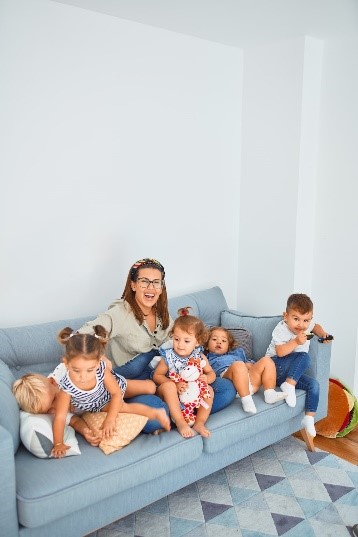
In 2020, the Covid-19 pandemic added a new layer of complexity to our lives, most notably to the lives of mothers where many experienced additional demands in an already demanding role (Hand et al., 2020). Child and Family Studies Centre member, Dr Sally Savage had noticed in her own teaching that many students, particularly those who had children at home, were struggling with the extra demands of caring for and schooling children at home, in addition to negotiating work commitments and their own study, during the pandemic. She undertook a study to interview students who are carers, particularly in relation to Covid-19, and whether they felt supported by their university. Regardless of the pandemic, research in this area stated that student-carers often do not feel welcome at university and that the university was not supportive of their circumstances (Dickson & Tennant, 2018). Student-carers were more likely to continue with their studies if they felt supported by the university through getting to know the academic staff on a more personal level (Stone & O’Shea, 2019), having access to counseling, and having childcare available on campus (Dickson & Tennant, 2018).
Savage’s findings suggested that although many supports were put in place such as automatic extensions for assessments, there were other ways that universities could assist student-carers to feel more connected and to create a sense of belonging more broadly. In July this year, Sally approached the CIESJ Faculty Equity Committee to see if they would support a fortnightly group for students who are carers. The idea was that this group would be open to any students with caring responsibilities, and would run once a fortnight, alternating on-campus with online sessions with a view to providing an opportunity for student-carers to get together, build connections, and support networks, through sharing tips and experiences.
The group has been small this year and thus far, only students caring for young children have attended. Sally commented that it was hard to get the word out initially and although she had envisaged a group where student-carers would gather together, chat and perhaps engage in some well-being activities, there was the unexpected surprise of carers turning up with their children. Something Sally said she did not expect, but in retrospect has found to be what student-carers need to feel connected and also provides a space where they feel valued as a student and in their role as a carer.
In particular, when speaking with the student-carers about what they wanted from the sessions, they stated they just wanted to gather together and chat. The student-carers have commented they like to be able to bring their children onto campus and have really valued being able to meet and talk with other carers who shared similar caring and studying experiences. Welcoming their children within the university space also contributes to the student-carers feeling that they belong within the space (Hook et al., 2022).
Sally plans to run the sessions again in 2023 with the preference for the existing group to have regular on-campus get-togethers with their children. However, there are also plans to have a separate online group for those not able to join in person. There is a hope that as word gets out, the group will grow in size and that it continues to elevate the university experience of students with caring responsibilities by offering a network of support. Along with, an opportunity for those with caring responsibilities to check in and chat with existing student-carers about their experiences and to inform their choices about further study.
Read more here: Savage, S. (2021). The experiences of mothers as university students and pre-service teachers during Covid-19: recommendations for on-going support. Studies in Continuing Education
References:
Dickson, M., & Tennant, L. (2018). “The accommodation I make is turning a blind eye”: Faculty support for student mothers in higher education. Studies in Continuing Education, 40(1), 76-97.
Hand, K., Baxter, J., Carroll, M., & Budinski, M. (2020). Families in Australia Survey: Life during Covid-19 Report no. 1: Early findings. Melbourne: Australian Institute of Family Studies.
Hook. G., Moreau, M-P., & Brooks, R. (Eds). (2022). Student carers in higher education: Navigating, resisting, and re-inventing academic cultures. Routledge.
Stone, C., & O’Shea, S. (2019). “My children … think it’s cool that mum is a uni student”: Women with caring responsibilities studying online. Australasian Journal of Educational Technology, 35(6), 97-110.